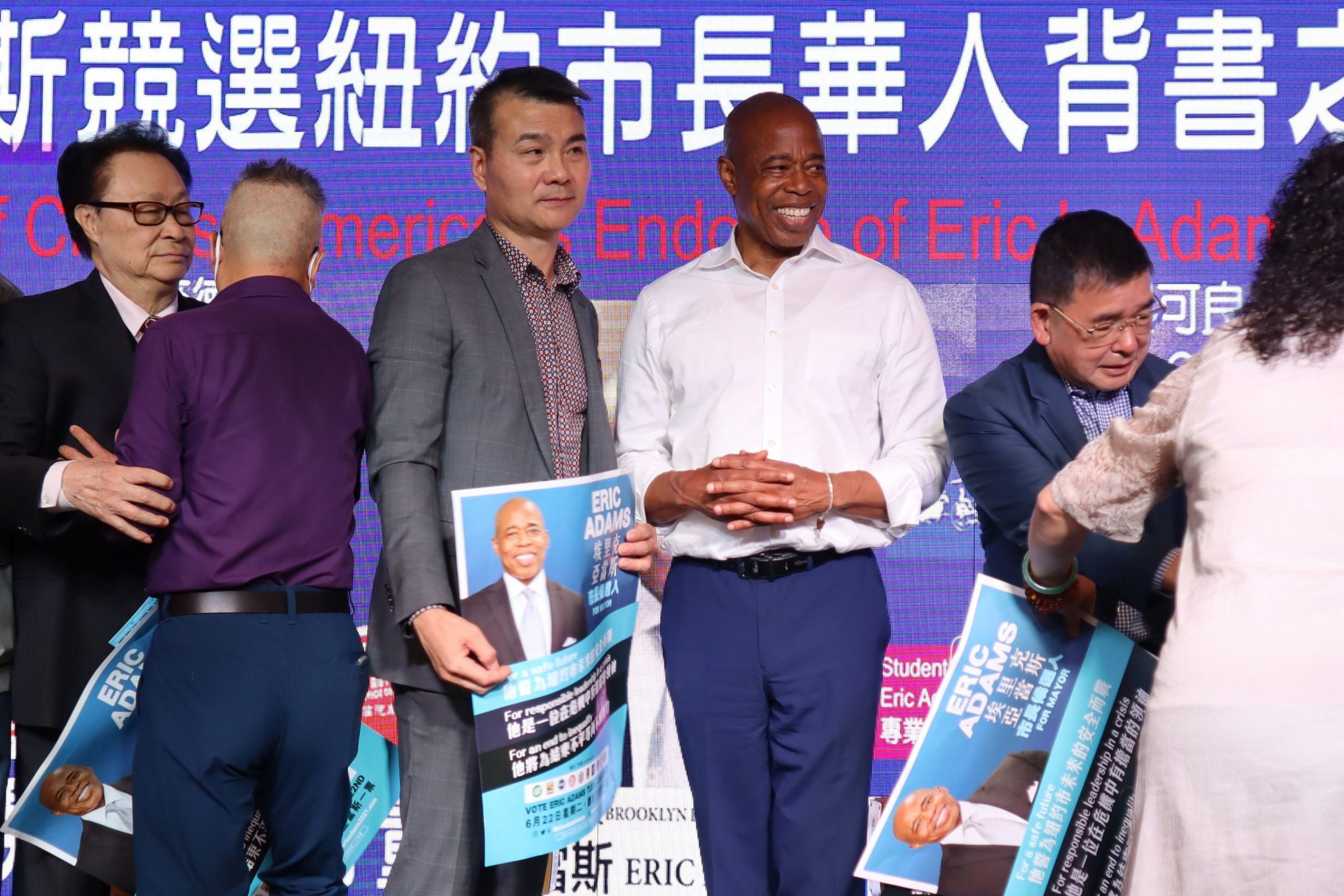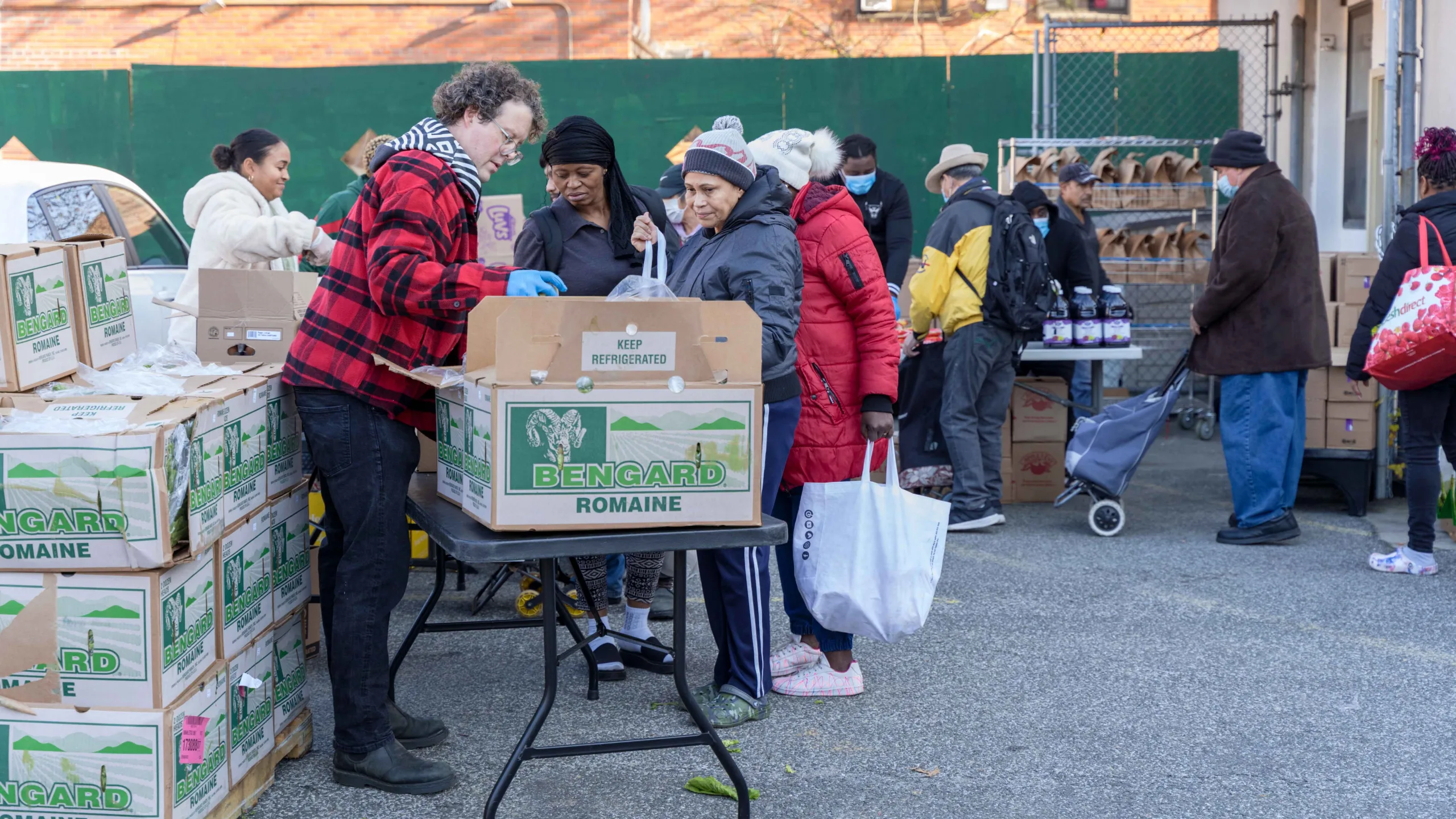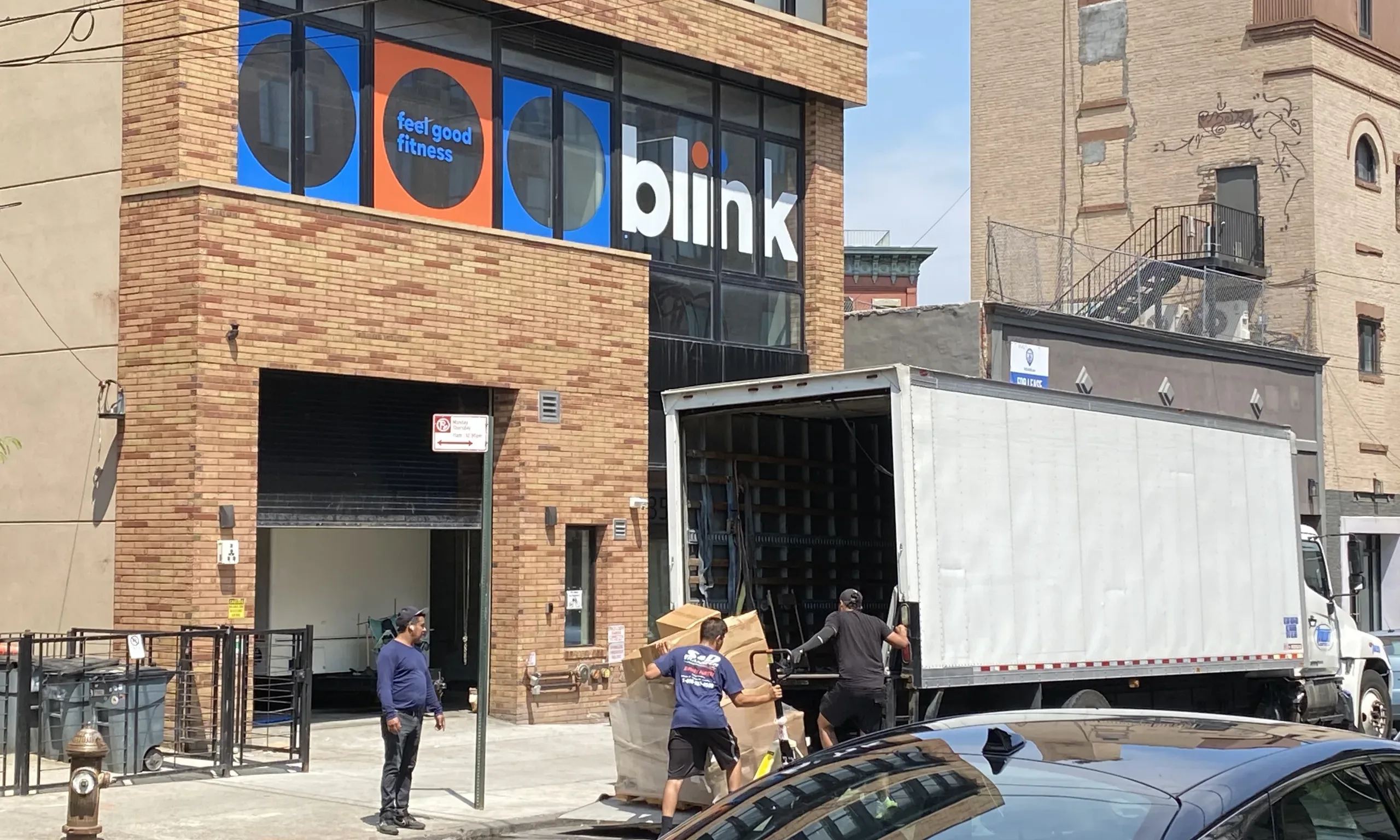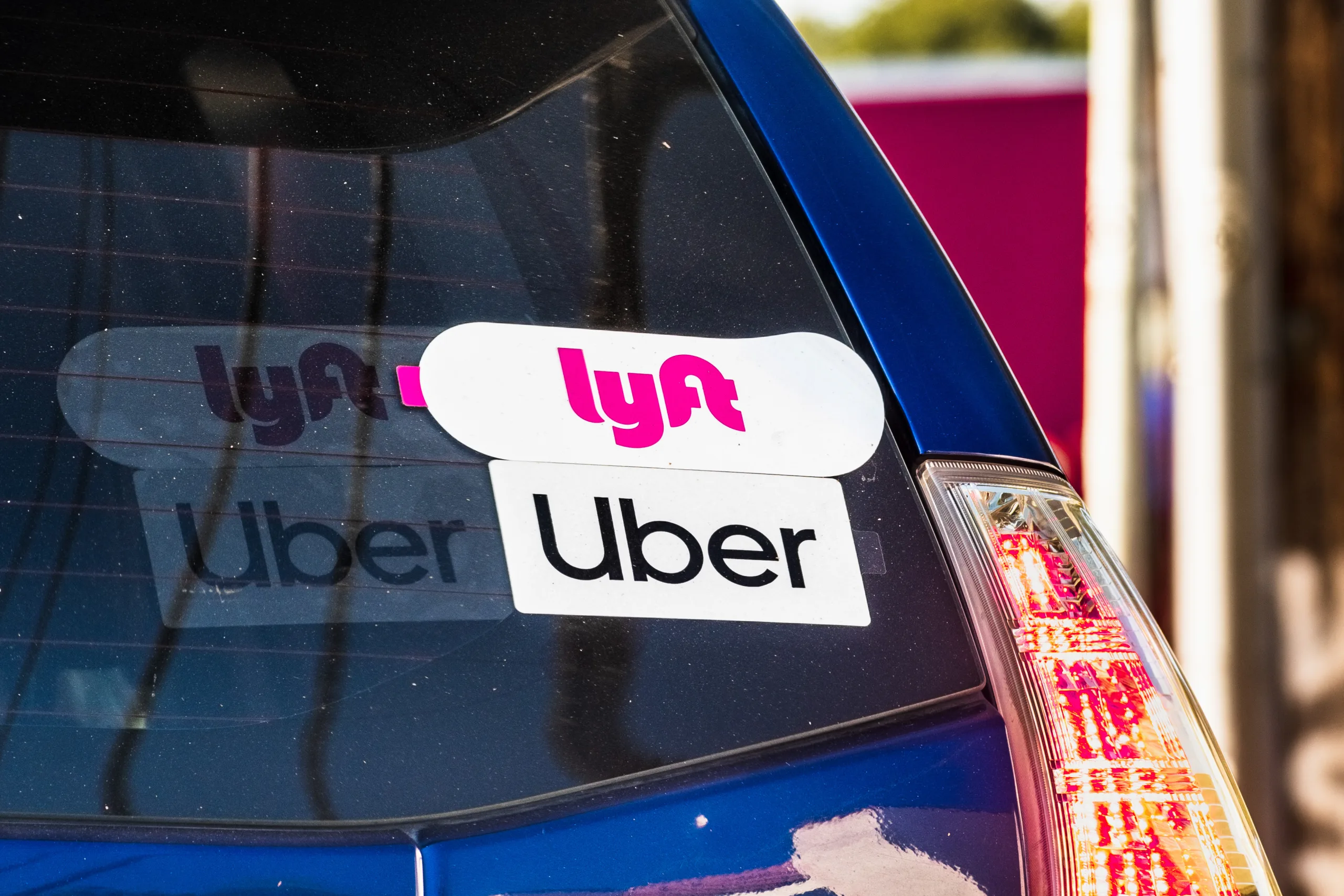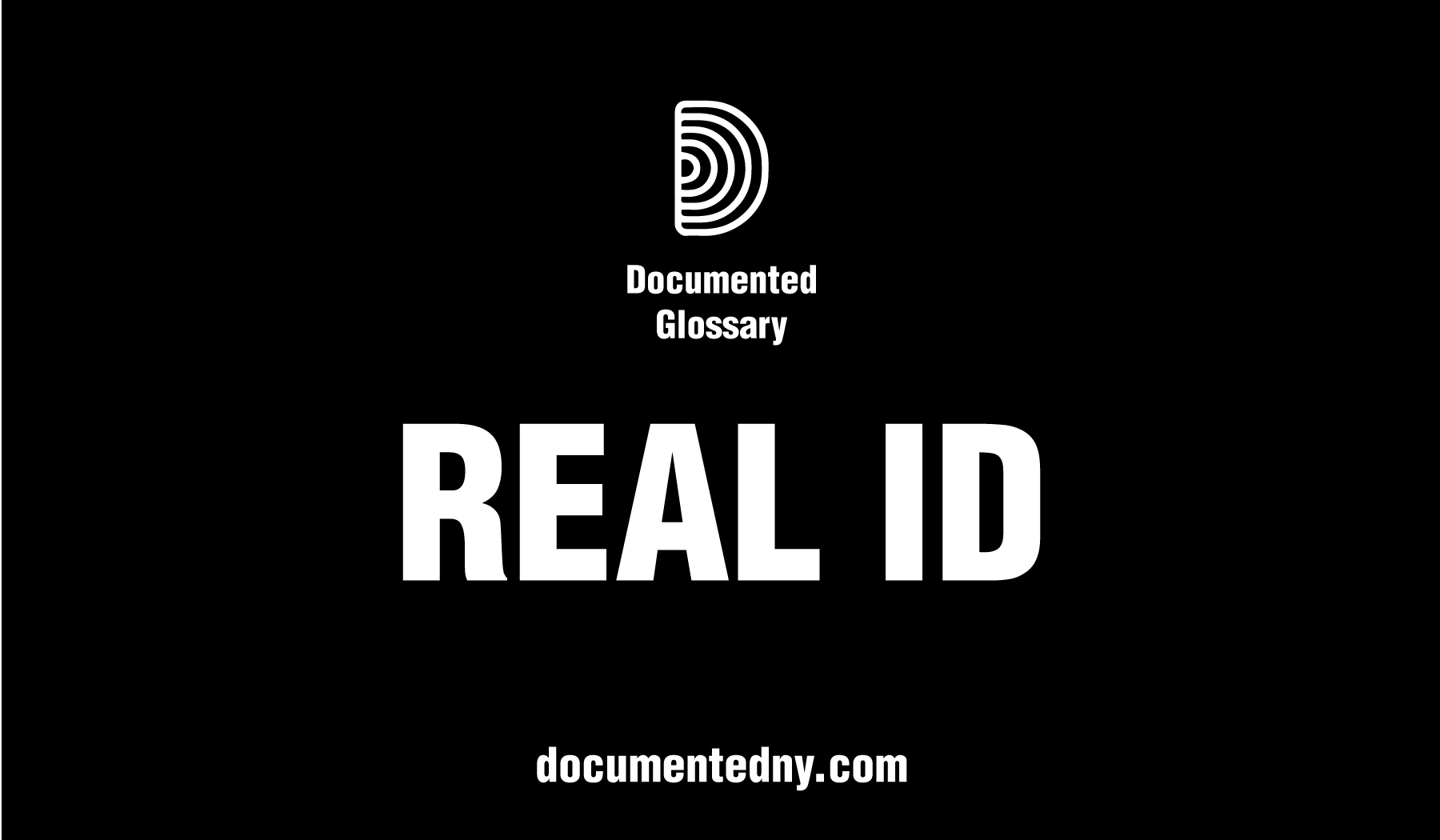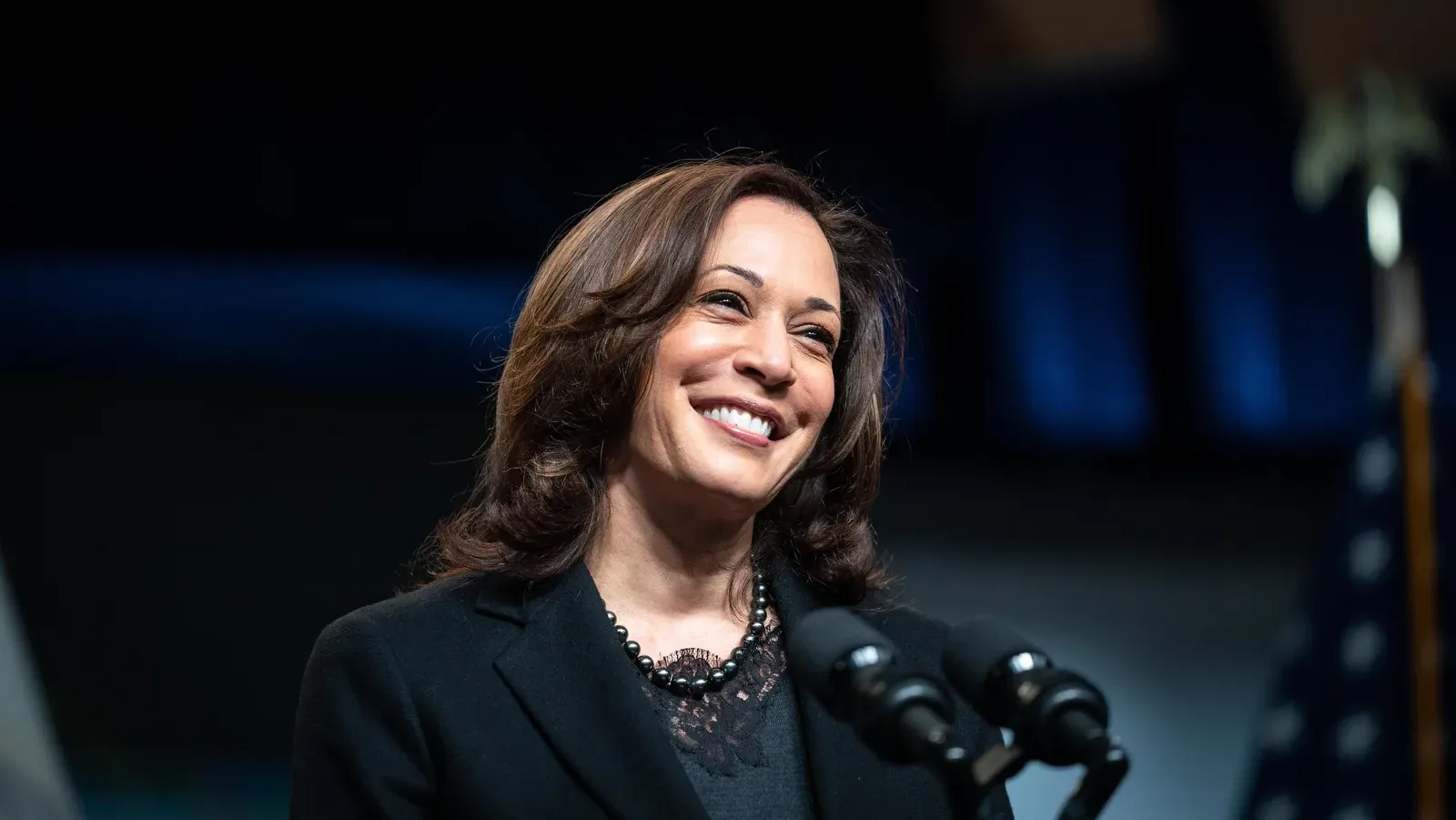阅读中文版:纽约市长亚当斯“捐款门”再生疑云:有人称捐款后获报销,有人称被冒捐
This article was originally published on Aug 18 4:58pm EDT by THE CITY
One woman, a low-wage worker at the New World Mall in Flushing, Queens, said that in the summer of 2021 her boss had asked her to bring her checkbook to work. The next day, she recalled, she was told to sign a check for $249, unaware it was for the campaign of then mayoral candidate Eric Adams. Immediately afterwards, she recalled in an interview with THE CITY, a stranger, whom her bosses knew, reimbursed her with cash — making the “contribution” an illegal donation.
Another woman listed as an Adams contributor said she never made out a $245 Chase bank check with her name and address that was submitted by the Adams campaign to the Campaign Finance Board in 2021. The form the Adams campaign sent listed her as a “deliveryman” at a Flushing restaurant that doesn’t do delivery. Aside from not being a man, she said she doesn’t bank at Chase, didn’t recognize the signature on the check, and never worked at the restaurant — a claim which the restaurant’s manager affirmed.
A recent college graduate told THE CITY his signature was forged on a $250 money order submitted by the Adams campaign in October 2019. The young man also said his now-deceased father was not an Adams donor either, even though he was listed in official contribution records as sending his own $250 money order to the campaign on the same day as his son. In campaign records, the older man was listed as “a housewife,” and his signature looks nothing like previous signatures he used in publicly filed property transactions.
The four donations are among two clusters of contributions involving at least 127 people and totaling at least $39,938 to Adams’ 2021 mayoral campaign. One includes numerous donations, mostly from October 2019, from the employees and associates of a New York City-based appliance chain, AC & Appliances Center.
The other centers on employees at The New World Mall, a shopping center in Flushing, and Jmart, an Asian-American grocery chain, who purportedly gave between April and August 2021. Expenditure records show that throughout his campaign, Adams paid $50,093 for eight fundraising events with hundreds of supporters held at the Royal Queen restaurant on the top floor of the mall.
The clusters, identified by THE CITY through a review of thousands of campaign finance records and dozens of interviews, contain signs that campaign finance experts say should have been obvious red flags to the Adams campaign and the city’s Campaign Finance Board.
Most of the donations are at or just under the limit qualifying them for public matching funds that, under an expanded city program used for the first time that election cycle, multiplied their value as much as eight times. Dozens came from low-wage workers or people who were listed as unemployed or retired, and only a handful of them are from registered voters. THE CITY is keeping the names of the people who described fraudulent donations anonymous out of concerns of possible retribution.
The donations supercharged public fundraising for the soon-to-be-mayor. Under the 8-to-1 matching fund program, donations of $250 can generate up to $2,000 each in public funds. The public windfall to the Adams campaign was as much as $213,744, according to matching figures submitted to the Campaign Finance Board.
In all, Adams collected a total of $10.1 million in taxpayer-supplied funds in his 2021 march to City Hall — the largest amount to date received by a candidate under the city’s campaign finance system.
It is unknown whether the straw donations uncovered in THE CITY’s investigation are part of an influence-peddling scheme by people looking to gain influence with the candidate or were isolated anomalies.
Evan Thies, Adams’ campaign spokesperson, declined to identify the individuals who bundled and delivered the donations associated with the two clusters.
“The campaign always diligently follows all laws and rules on the collection of contributions, and also explicitly instructs campaign staff, volunteers, and contributors how to follow the laws,” Thies said. “But it is impossible to respond to unverifiable claims attributed to anonymous sources. If any contributions were made incorrectly, the campaign would work with the campaign finance board — as it has before — to determine if refunds should be made. Until any proof of such claims is established or made officially, it is irresponsible for The City to infer any wrongdoing by the campaign or its staff.”
The accounts of the straw donors echo explosive charges contained in July’s indictment by Manhattan District Attorney Alvin Bragg of a crew of Adams’ campaign donors.
The indictment alleged that six organizers were part of a conspiracy to have proxies donate on their behalf and then reimbursed as part of a scheme to generate matching funds for Adams. There is no indication that Bragg is investigating Adams. “The campaign always held itself to the highest standards and we would never tolerate these actions,” said Thies.
Other aspects of THE CITY’s investigation raise a deeper set of questions about how easily New York City’s public matching funds program, meant to empower people of average means, can be exploited by wealthy interests. Donors in both the New World Mall-Jmart cluster and the AC & Appliances Center cluster told THE CITY that they made their contributions at the behest of or with encouragement from managers at their workplaces.
New World Mall’s former co-owner, Tian Ji Li, is a major political player in New York City’s Chinese American community. Li serves as the president of the Alliance of Asian American Friends, a coalition of provincial and business associations, and was referred to in the Chinese-language press as the head of the Adams campaign office in Flushing. He personally tried donating $8,100 to Eric Adams’ 2021 campaign, but received two refunds for exceeding the $2,000 limit.
Likewise, Lian Wu Shao, chairman of both the mall and Jmart, the mall’s major retailer, gave $2,000 in his individual capacity, while a relative and a Jmart co-owner, William Shao, gave $249.
/cdn.vox-cdn.com/uploads/chorus_asset/file/24856933/081523_new_world_mall_jmart_1.jpg)
Through the eight-to-one match, the $28,739 donations by the businesses’ cashiers, salespeople, and retirees added up to an extra $178,144 in potential public matching funds.
With the AC & Appliances Center cluster, Adams’ campaign secured at least 26 contributions from the companies’ employees, associates or relatives of employees, public records show. At least seven of those were by money order, a relatively-rare, hard-to-trace form of payment. The Adams campaign submitted these approximately $6,950 worth of donations to the Campaign Finance Board for $31,600 in public matching funds.
In interviews, several donors in both clusters, many of them first-generation immigrants, expressed confusion about the contributions made in their names, claiming they didn’t believe that they had donated to Adams or that they thought they were giving to something other than a political campaign.
One Jmart employee told THE CITY she thought she was donating to help with infrastructural or neighborhood projects for her community in Flushing. “Did someone swindle me?” asked the young woman, who migrated to the U.S. from China not long before she made the donation.
“I must’ve been brainwashed,” she said.
Several donors said they made their donations willingly and did not receive compensation for them, but some of their accounts raise their own questions.
Yuzan Qiu, who is listed in campaign records as a bookkeeper at a grocery store at the New World Mall, told THE CITY that he gave $249 to the Adams campaign because that was all he had left in his bank account.
Asked about the donations raised at the mall, Li said during a phone interview, “The stuff about the New World Mall, I don’t know about that.” He said that fundraising “really has nothing to do with me,” although he was listed in the Chinese language press as the head of the 2021 Adams campaign office in Flushing and was seen standing by Adams side and enthusiastically cheering him on at a 2021 mall rally.
He was not officially registered as a campaign worker on Adams’ expenditure forms and minimized his campaign involvement during the interview. “This is all really simple,” he said. “Adams’ campaign office rented a place, and mainly it was to help the community get information and knowledge about the election.”
Lian Wu Shao did not return requests for comment by email and at the mall office. William Shao also could not be reached through a listed phone number.
Campaign contribution bundlers, called intermediaries by the Campaign Finance Board, are required in many instances to be reported under the law. The Adams campaign said it scrupulously followed which types of events required intermediaries to be recorded and which didn’t. It listed four intermediaries in a mayoral campaign that raised $8.9 million in private funds. His closest competitor, Kathryn Garcia, who raised $2.1 million in private funds, listed 40.
Howard Graubard, a longtime New York election attorney, found the lack of intermediary reporting concerning. “If I was a campaign treasurer and I was dealing with the campaign finance board, I think I would want to be extremely cautious in my interpretation of the rules,” he said. “When you’re holding an event where it’s obvious that people have solicited the contributions you might want to err on the side of caution.”
He said he could understand a campaign missing checks that could have used greater scrutiny. “I could see where a treasurer might not notice that,” he told THE CITY. “But the money orders is like being hit with a pie in the face. Any campaign that receives a bunch of money orders from the event. You can be colorblind and that’s still gonna be a red flag.”
Reform and Abuse
New York City launched its public matching funds program in 1989 following the worst municipal corruption scandals in recent city history. The goal was to counter the influence of big money in local politics by matching smaller contributions with public funds. The program’s original one-to-one match of donations of up to $1,000 has since expanded to eight-to-one for donations up to $250.
Tighter restrictions apply to donors with business before the city, limiting them to $400 in an election. But the lure of matching funds for smaller donations has also led to prosecutions of candidates, campaign officials and donors who attempted to abuse the system. Candidates and their campaign workers risk criminal fraud charges if they falsify contributions or reimburse people for their donations. Contributors themselves, while rarely if ever prosecuted, violate the law, as well, if on a form required by the Campaign Finance Board, they attest to making a contribution for which they have been reimbursed, a classic straw donor maneuver.
In 1995, Ronald Reale, a former transit union leader who had run for public advocate, was convicted of federal charges including more than 50 fraudulent money orders totalling $50,000 submitted by his campaign.
Eight years later, an otherwise respected veteran former city council member, Sheldon Leffler, was convicted in state court of allowing a donor to submit $10,000 in fake money orders to bolster his campaign for Queens Borough President.
And in 2013, a former campaign treasurer and donor to John Liu, the former city comptroller who was running for mayor, were convicted federally of using similar so-called “straw donors” totalling approximately $20,000 to inflate Liu’s bid for City Hall. (Liu was not charged, although his campaign was later fined by the campaign finance board for alleged abuses.)
Most recently, former state Lt. Governor Brian Benjamin was indicted last year on federal bribery charges stemming from a scheme — first exposed by THE CITY — that included the use of straw donors by a supporter of his campaign for city comptroller to whom Benjamin attempted to funnel a $50,000 state grant. Benjamin was forced to resign from office, but the charges against him were later dismissed by a federal judge who ruled there was no explicit quid pro quo between Benjamin and the donor.
Despite those problems, the city’s campaign finance program has been widely lauded for evening the playing field and allowing more candidates from underrepresented communities to run for office and win election. In 2021, the program doled out $126 million in public matching funds, the most since the program’s inception. But such generosity has also left the board struggling to conduct timely audits, and its scrutiny of campaigns like Adams’ 2021 successful bid remains incomplete almost two years later.
A spokesman for the board, Tim Hunter, declined to comment on the reasons for the long delay or any questions relating to the Adams 2021 campaign but said its scrutiny of the campaign’s filings continued.
But much of the initial scrutiny of donors is up to the campaign itself, said John Kaehny, executive director of Reinvent Albany, a good government advocacy group.
“It behooves the campaign to look at who their contributors are, to ask why did we get these donations from this group of people?” said Kaehny. “You see stuff like postal money orders, no identified intermediary, a geographic cluster or employment cluster of donors not connected to any reported event, that’s got to be looked at.”
Forgery Claims at the Appliance Store
On October 10, 2019, as Adams was amassing his warchest ahead of his official mayoral campaign launch, the soon-to-be candidate attended a banquet at a restaurant in Brooklyn. According to Sina, a Chinese-language newsite, the event was sponsored by AC & Appliances Center, whose owner, Hai Mo Zhong, is also a vice-president at the Chinese Business Association of New York.
Several Chinese-American business leaders attended the fundraiser, as well as Winnie Greco, a longtime liaison to the Asian community who is now special advisor and director of Asian affairs in the Adams administration.
“Chinese and overseas Chinese stood up to speak out for Adams, saying that they would support Adams’ election together. Everyone cheered in unison and gave their all to help Adams win the election,” MGM Media, a Chinese-language media organization, reported at the time.
/cdn.vox-cdn.com/uploads/chorus_asset/file/24856930/081623_flushing_electronics_1.jpg)
The event coincided with a bundle of $250 contributions from the appliance chain’s owner and apparent CEO along with more than a dozen that forms submitted to the Campaign Finance Board indicated came from contractors, subcontractors, employees and relatives affiliated with the chain.
Some of the official contribution cards from this appliance store cluster — including that of the college graduate who says his signature was forged — contained scant information, exhibited similar handwriting, and came from people unregistered to vote. And at least two of these money orders, which appear to be from this cluster, were made on October 10, 2019, according to the Adams campaign. But the original contribution cards show that the donation was signed and dated on October 15, 2019.
Nine of the appliance store-related contributions came in $250 money orders, including the two that the college graduate says were forged in his name and that of his father.
The young man said that while he occasionally worked as a stock boy for the appliance company, he did not attend the 2019 fundraiser for the mayor.
He said he has only used a money order once, for an upstate traffic ticket. “I don’t think it’s ok for them to use my name,” the Queens-native told THE CITY. “I think it’s fraudulent.”
THE CITY identified at least four other $250 money orders signed on the same day and issued from the same post office as that used for the college graduate’s contribution. Three of the money orders displayed similar handwriting in recording the money orders’ recipient: “Eric Adams 2021.”
/cdn.vox-cdn.com/uploads/chorus_asset/file/24857323/adams_money_orders_1.jpg)
Zhong, the appliance store’s owner, told THE CITY he was only involved with the banquet to encourage supportive contractors to attend, and that he knew nothing about how any of the donations were handled or processed thereafter. Zhong added that the Adams’ campaign office had “sent a lot of people who were specifically responsible for fundraising” to the event.
“They collected all the money,” he said. “None of us touched any of the money,” he added.
Thies, Adams’ campaign manager, declined to say who organized the money orders for the Adams campaign at the banquet.
“Everything was done properly and normally” as far as he was aware, Zhong continued, adding that, as a businessman, he was unfamiliar with campaign finance regulations. “There may be things that we don’t understand, but we just did what we were asked to, there’s not much else.”
The Windfall at The Mall
The appliance store donors gave at a time, two years before Election Day, when mayoral candidates were competing to run up large donation tallies that indicated they could mount a strong campaign. The first major bundle of New World Mall-JMart donations came more than a year later, in spring 2021, when Andrew Yang, the only Asian candidate in the mayoral race, was leading the polls.
The 2021 contributions coincided with two fundraising events held at the Royal Queen Restaurant, a large banquet hall on the top floor of the mall. They were high-profile, involving government officials who included Queens Borough President Donovan Richards, Councilmember Peter Koo (D-Queens) and major Chinese-American community figures, including Greco and Li.
Even after Adams won the Democratic primary against Garcia in July 2021 by little more than 8,000 votes, virtually assuring the mayoralty, donations kept pouring in. On Aug. 8, 57 employees listed in Adams campaign filings as employed by Jmart or the New World Mall contributed to the presumptive mayor. By this point, he was sitting on a considerable surplus, making the contributions mostly relevant to the political future, and giving those who organized them a chance to show their allegiance to a man who was soon to become the most powerful figure in New York.
/cdn.vox-cdn.com/uploads/chorus_asset/file/24856971/081623_new_world_mall_1.jpg)
In interviews, some New World and Jmart mall employees told THE CITY that their bosses directed or encouraged them to give to the campaign — raising questions about how much these low-wage employees chose to give of their own volition. Ninety-four gave exactly $249 to the Adams campaign, supporting some employees’ claims that the contributions stemmed from a coordinated effort.
Nonetheless, the Adams campaign did not disclose any intermediaries for the hundred plus contributions made by Jmart supermarket employees and other retail and food vendor employees located at the New World Mall throughout 2021. Of the 104 donors in the New World Mall and Jmart supermarket cluster, only seven were registered voters in New York. Ninety-four gave exactly $249 to the Adams campaign.
An Adams campaign official noted: “There are a number of exceptions to when intermediaries need to be reported, most notably in the case of campaign-sponsored events and house parties.”
The employee at New World Mall who said she was reimbursed for her contribution to Adams, said her employers told her to bring her checkbook to work that day. She said the accompanying contribution card in her name was filled out for her, but that she trusted the process because her bosses were familiar with the man who took her check and gave her cash in exchange.
She said she can’t recall whether she’s ever seen the donation card — which included in Chinese an affidavit stating that the contribution was made in her own name and with her own funds. Upon reviewing the signature on the contribution card, however, the employee said it “doesn’t seem to be signed by me.”
“The content of the donation, I really don’t have much clue what it’s all about,’” she told THE CITY in an in-person interview.“He said to help him out…I didn’t think much of it, I just thought I should help if I can.”
Likewise, a butcher at Jmart said that the day after Adams visited the mall in August 2021, “mall office people” told him and coworkers that if they were willing to donate to the campaign, they should bring their checkbooks to work. The butcher also said that the mall office gave them the contribution forms and told them about the $250 limit for matching funds. The butcher said that the next day, he signed a check and brought it to the mall’s manager’s office on the first floor of the mall.
TestPost3
When asked why he wanted to donate to Adams, the butcher, who said he has never registered to vote due to language barriers, said in Mandarin, “No reason, just want to have a new mayor.”
Jun Xu, another Jmart employee, said he donated $249 because “they said something like $250 being the limit.” But Xu became combative when asked follow-up questions about the fundraising initiative.
“There are a lot of whys that I have no way of answering,” he said. “There are a lot of whys that I don’t know about,” he said, standing at his apartment door. “Don’t ask so many whys.”
THE CITY is an independent, nonprofit news outlet dedicated to hard-hitting reporting that serves the people of New York.
